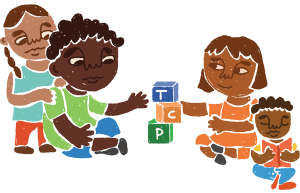Our Vision: All children, regardless of their race, ethnicity or place of birth, have the resources and opportunities they need to grow up healthy and thrive.
Our Approach: We harness the power of partnership to achieve child health equity in California.
HEALTHY CHILDREN

- Ensure Medi-Cal coverage and reforms work for children, and center family, youth and community lived experience in health care systems.
- Emphasize prenatal care and early childhood development as the foundation of life-long health and well-being, including healthy pregnancy and birth, and addressing the health-related social needs of birthing people, families, and young children ages 0-3.
- Improve mental health and social-emotional well-being for children, youth and families through community-defined healing that is liberating, trauma-informed, culturally responsive and gender-affirming.
STRONG, ECONOMICALLY STABLE, CONNECTED FAMILIES
- Improve access to a stable, affordable and safe place to call home, including stronger protections for tenants, more investments in deeply affordable housing, and increased power of people most impacted by housing insecurity.
- Ensure access to affordable broadband, devices and digital literacy to open doors for all children and families to health care, education, employment, housing and public benefits.
- Provide financial support to children and families experiencing income instability, including cash aid, tax credits, trust and savings accounts, and other cash supports.
- Recognize and support reparations as an opportunity for change, a fundamental component of addressing racism and its lingering effects, and pursuing equity and healing.
SAFE & WELCOMING COMMUNITIES

- Increase community power by bringing health care into the community and the community into health care through a community-based health workforce including community health workers, promotores, community representatives, peers, doulas and home visitors.
- Build strong, well-resourced schools and early learning programs that nurture the whole child with mental health supports, programs grounded in cultivating cultural identity and youth development, the arts, and dual immersion/multilingual programs.
- Transform public systems to eliminate barriers and improve access to health, food, housing, mental health, income and social supports.
We can dismantle the racism embedded in our social, economic and political systems to improve children’s health, especially children from historically marginalized communities of color.
FEDERAL POLICY
- Reform the federal immigration system so that it includes a pathway to citizenship, keeps families together, and increases access to services and programs that protect health and well-being.
- Increase federal flexibilities and investments to improve Medicaid and child health programs through continuous multi-year coverage, community-based workforce, and family-centered care.
- Provide economic support for families by making the Expanded Child Tax Credit permanent and removing its immigration-related restrictions.
- Increase investments in supports that address maternal and infant mortality and prioritize healthy early childhood development, such as community-based doulas, community health workers, and public programs like WIC and the Maternal, Infant, and Early Childhood Home Visiting (MIECHV) program.
California is at the forefront of the changing demographics of the nation, and we champion policies and programs at the state level that will serve as a model for the nation in our collective efforts to support children. By applying a children’s lens to issues under consideration by policymakers, we serve as a resource for leaders and partners to strengthen our shared agenda to support the needs of the most marginalized children.
CHILDREN'S HEALTH DATA & BACKGROUND

The Children’s Partnership’s A Child Is A Child campaign unites a diverse coalition to fight for the rights of every child. The data and research provide a snapshot of the health assets and needs of our children.
This research lays the foundation for a collective equity agenda to transform current programs and policies. We are working toward a California where:
- All children are healthy.
- All families are economically stable and well-connected to resources that support their well-being.
- All communities are well-resourced, safe and welcoming.
Explore the data: bit.ly/AChildIsAChild
Contact: Maddie Ribble, mribble@childrenspartnership.org
